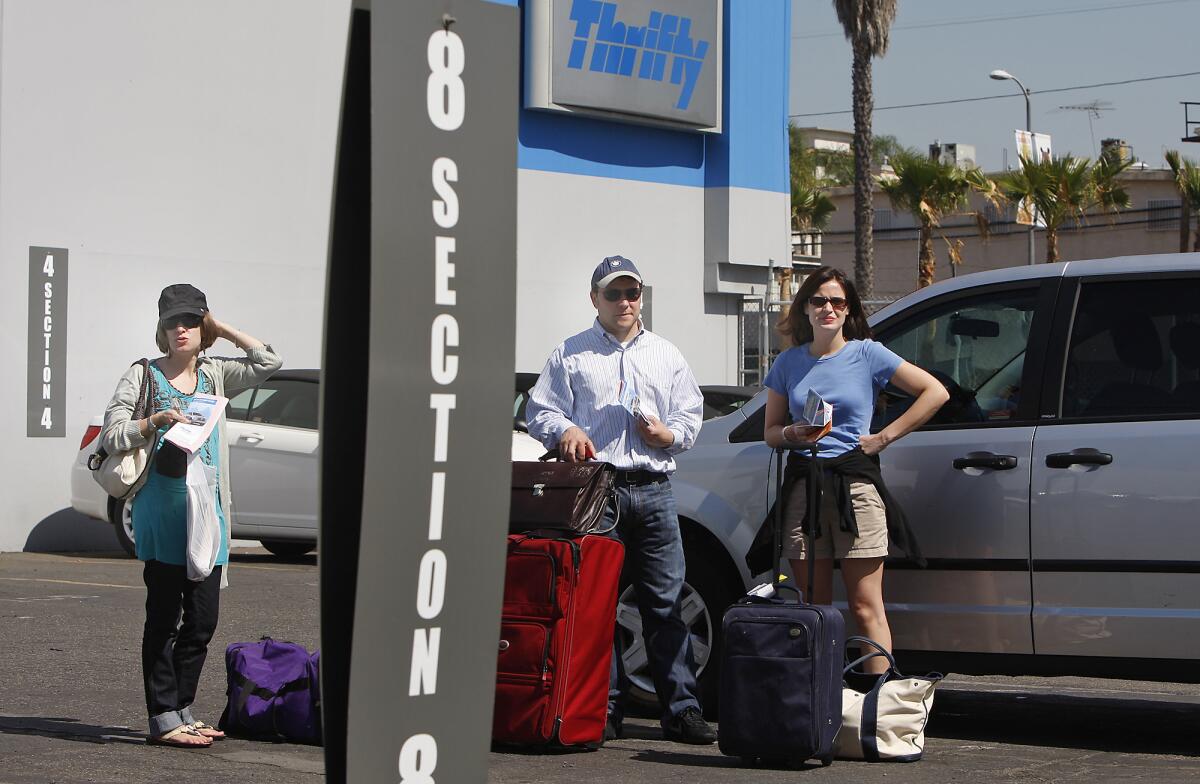Study up on benefits your credit card offers; it might save you money

When traveling, your credit card can help you save money on rental car fees and more.
- Share via
Fifty thousand bonus miles! Free checked bags! Lounge access! Credit card issuers attract new applications by highlighting lots of splashy perks, but some of their least-hyped benefits may be some of the most valuable.
Linda Beltran, an entertainment executive based in Orlando, Fla., learned that firsthand when she had a fender-bender in a rental car. “When I returned the car to Enterprise, they noticed damage to the front bumper and asked for my insurance information,” she said.
Beltran had charged the rental to her Chase United MileagePlus Explorer card. Many credit cards offer secondary collision damage waiver insurance that covers only damage to the vehicle and kicks in once your personal insurance or insurance purchased from the rental agency has been exhausted, but Beltran’s card offered more comprehensive primary coverage.
“I forwarded the claim from Enterprise for $600 to Chase,” Beltran said, “and in a few weeks, Chase notified me that they had negotiated the settlement down to $500 and that I was covered.”
Gary Leff, founder of the travel and credit card blog View From the Wing (viewfromthewing.boardingarea.com) notes that most premium cards come with a variety of protections, but consumers don’t always realize this. “People see bundles of benefits,” Leff said, “but they lose focus on the details and don’t take advantage of benefits such as having your card reimburse you if you’re delayed while traveling and incur expenses like a hotel stay or meals.”
Joseph Hostetler, a writer in Dayton, Ohio, applied for the Chase Sapphire Preferred card for a big sign-up bonus. But after a baggage delay for which Chase reimbursed him $500 for his expenses and rental car insurance that covered $2,300 in damage to a vehicle he was driving, Hostetler said, “During one trip, my credit card reimbursed me a total of $2,800 worth of headaches. That’s worth the $95 annual fee to me.”
Leff pointed to two other travel benefits. “Trip delay and trip cancellation coverage can mean real money in your pocket when your plans go wrong,” he said.
Here are some of the most important travel-specific benefits to look for; you can find what your card offers by calling your company or going online.
Trip cancellation: Offered by most premium credit cards to cover part of the cost of your trip (usually between $1,000 and $10,000) if you must cancel.
Caveat: A lot of exclusions, so if you wish to invoke it, there must be a true emergency such as severe weather or no preexisting illness.
Trip delay coverage: Kicks in if your trip is delayed more than 12 hours or requires an unplanned overnight stay. Coverage is usually up to $500 per person.
Caveat: Does not usually include car rentals and is supplemental to any reimbursement you first receive from your carrier.
Travel accident insurance: Ranges between $250,000 and $500,000 for medical expenses if you are injured or killed during a trip.
Caveat: Exclusions such as self-inflicted injuries or those that result from intoxication or political upheaval in your destination.
Rental car insurance: Most offer secondary insurance to cover vehicle damage that applies only after your personal insurance is exhausted. Some premium cards now offer primary coverage.
Caveat: Most policies contain exclusions based on vehicle type (no Ferraris!) and country, such as Italy and Israel, as well as caps that typically hover around $50,000.
Lost/delayed baggage: Coverage usually goes into effect for delays of more than four to six hours at a rate of $100 per bag per day up to five days. Lost baggage coverage ranges up to $3,000 per passenger.
Caveat: Caps can be lower in some states.
Purchase protection: Covers damage to or theft of recent purchases made with your card.
Caveat: There are monetary caps per occurrence and per year.
Hotel benefits: Major issuers have partnerships with groups of hotels — such as Visa Signature Hotels, American Express Fine Hotels & Resorts and MasterCard’s World Experiences & Offers — that confer benefits such as room upgrades and resort credits.
Caveat: You may forgo earning hotel points by booking through one of these programs.
More to Read
Sign up for The Wild
We’ll help you find the best places to hike, bike and run, as well as the perfect silent spots for meditation and yoga.
You may occasionally receive promotional content from the Los Angeles Times.





